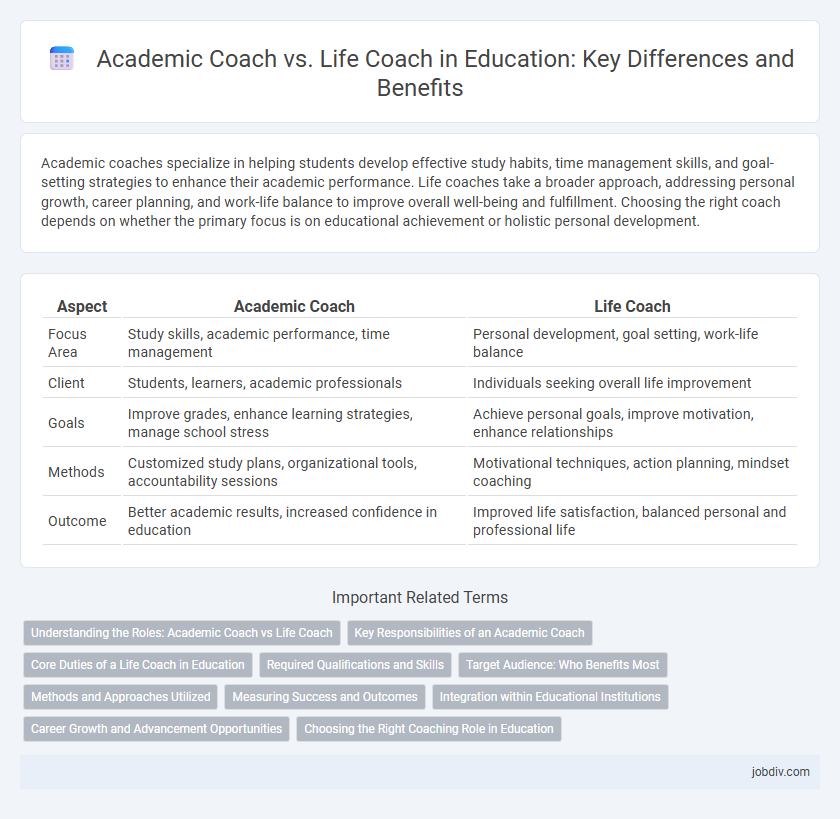Academic coaches specialize in helping students develop effective study habits, time management skills, and goal-setting strategies to enhance their academic performance. Life coaches take a broader approach, addressing personal growth, career planning, and work-life balance to improve overall well-being and fulfillment. Choosing the right coach depends on whether the primary focus is on educational achievement or holistic personal development.
Table of Comparison
| Aspect | Academic Coach | Life Coach |
|---|---|---|
| Focus Area | Study skills, academic performance, time management | Personal development, goal setting, work-life balance |
| Client | Students, learners, academic professionals | Individuals seeking overall life improvement |
| Goals | Improve grades, enhance learning strategies, manage school stress | Achieve personal goals, improve motivation, enhance relationships |
| Methods | Customized study plans, organizational tools, accountability sessions | Motivational techniques, action planning, mindset coaching |
| Outcome | Better academic results, increased confidence in education | Improved life satisfaction, balanced personal and professional life |
Understanding the Roles: Academic Coach vs Life Coach
An academic coach specializes in enhancing students' study habits, time management, and goal-setting skills to improve academic performance. A life coach focuses on personal development, helping individuals navigate life challenges, build confidence, and achieve broader life goals. Understanding the distinct roles of academic and life coaches ensures tailored support for either educational success or overall life fulfillment.
Key Responsibilities of an Academic Coach
An Academic Coach specializes in enhancing students' learning strategies, time management, and goal-setting to improve academic performance and study habits. They work closely with students to develop personalized plans that address specific educational challenges, such as exam preparation and organization skills. Unlike Life Coaches, Academic Coaches focus primarily on optimizing educational outcomes through targeted academic support and skill-building techniques.
Core Duties of a Life Coach in Education
A Life Coach in education primarily supports students in developing essential life skills such as time management, goal setting, and emotional resilience to enhance their overall personal growth. They guide learners in balancing academic responsibilities with personal challenges, fostering self-awareness and confidence for long-term success. Unlike academic coaches who focus on curricula and study strategies, life coaches emphasize holistic development and mental well-being, crucial for sustaining student motivation and achievement.
Required Qualifications and Skills
Academic coaches require expertise in educational strategies, time management, and subject-specific knowledge to support students' academic goals, often holding degrees in education or counseling. Life coaches focus on personal development, emotional intelligence, and goal-setting techniques, typically obtaining certifications from accredited coaching programs rather than formal academic degrees. Both roles demand strong communication skills, empathy, and the ability to motivate clients effectively.
Target Audience: Who Benefits Most
Academic coaches benefit primarily students seeking to improve study habits, time management, and academic performance, including high school and college learners. Life coaches target a broader audience, including professionals and individuals aiming for personal growth, career transitions, and work-life balance. Educational institutions often recommend academic coaches for youth while adults pursuing holistic self-improvement turn to life coaches.
Methods and Approaches Utilized
Academic coaches utilize structured strategies such as goal-setting, time management, and personalized study plans to enhance a student's learning efficiency and academic performance. Life coaches focus on holistic methods, including motivational interviewing, values clarification, and behavioral change techniques, to support overall personal growth and life balance. Both approaches employ active listening and accountability frameworks but differ in targeting educational skills versus broader life challenges.
Measuring Success and Outcomes
Academic coaches evaluate success by tracking improvements in students' grades, study habits, and mastery of subject material through regular progress assessments and standardized test scores. Life coaches measure outcomes based on clients' achievement of personal goals, enhanced self-awareness, and overall well-being, often using self-reported satisfaction surveys and behavioral changes. Both roles employ goal-setting frameworks and feedback loops to ensure measurable and tangible results aligned with individual development priorities.
Integration within Educational Institutions
Academic coaches specialize in improving students' learning strategies, time management, and academic performance, while life coaches focus on personal development, goal-setting, and emotional well-being. Integrating both roles within educational institutions enhances holistic student support by addressing both academic challenges and life skills. This combined approach fosters academic success and personal growth, creating a more comprehensive support system for students.
Career Growth and Advancement Opportunities
Academic coaches specialize in enhancing students' learning strategies, time management, and goal-setting skills to improve academic performance and prepare for higher education or specialized career paths. Life coaches concentrate on broader personal development, addressing mindset, confidence, and work-life balance to facilitate career growth and advancement across diverse industries. Choosing between an academic coach and a life coach depends on whether the focus is on educational achievement or holistic career and personal development.
Choosing the Right Coaching Role in Education
Academic coaches specialize in enhancing students' learning strategies, time management, and goal-setting skills to improve academic performance and success. Life coaches address broader personal growth areas such as motivation, emotional well-being, and career planning, helping students navigate challenges beyond the classroom. Choosing the right coaching role in education depends on the student's specific needs, whether targeting academic improvement or overall life development for holistic success.
Academic Coach vs Life Coach Infographic

 jobdiv.com
jobdiv.com